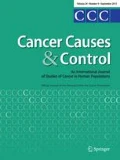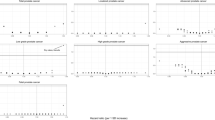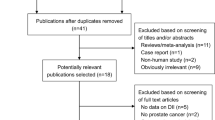Abstract
Individual-based studies that investigated the relation between dietary alpha-linolenic acid (ALA) intake and prostate cancer risk have shown inconsistent results. We carried out a meta-analysis of prospective studies to examine this association. We systematically searched studies published up to December 2008. Log relative risks (RRs) were weighted by the inverse of their variances to obtain a pooled estimate with its 95% confidence interval (CI). We identified five prospective studies that met our inclusion criteria and reported risk estimates by categories of ALA intake. Comparing the highest to the lowest ALA intake category, the pooled RR was 0.97 (95% CI:0.86–1.10) but the association was heterogeneous. Using the reported numbers of cases and non-cases in each category of ALA intake, we found that subjects who consumed more than 1.5 g/day of ALA compared with subjects who consumed less than 1.5 g/day had a significant decreased risk of prostate cancer: RR = 0.95 (95% CI:0.91–0.99). Divergences in results could partly be explained by differences in sample sizes and adjustment but they also highlight limits in dietary ALA assessment in such prospective studies. Our findings support a weak protective association between dietary ALA intake and prostate cancer risk but further research is needed to conclude on this question.



Similar content being viewed by others
References
Armstrong B, Doll R (1975) Environmental factors and cancer incidence and mortality in different countries, with special reference to dietary practices. Int J Cancer 15:617–631
Kolonel LN, Hankin JH, Lee J, Chu SY, Nomura AM, Hinds MW (1981) Nutrient intakes in relation to cancer incidence in Hawaii. Br J Cancer 44:332–339
Nomura AM, Kolonel LN (1991) Prostate cancer: a current perspective. Epidemiol Rev 13:200–227
Park SY, Murphy SP, Wilkens LR, Henderson BE, Kolonel LN (2007) Fat and meat intake and prostate cancer risk: the multiethnic cohort study. Int J Cancer 121:1339–1345
Crowe FL, Key TJ, Appleby PN et al (2008) Dietary fat intake and risk of prostate cancer in the European Prospective Investigation into Cancer and Nutrition. Am J Clin Nutr 87:1405–1413
Neuhouser ML, Barnett MJ, Kristal AR et al (2007) (n-6) PUFA increase and dairy foods decrease prostate cancer risk in heavy smokers. J Nutr 137:1821–1827
Schuurman AG, van den Brandt PA, Dorant E, Brants HA, Goldbohm RA (1999) Association of energy and fat intake with prostate carcinoma risk: results from The Netherlands cohort study. Cancer 86:1019–1027
Severson RK, Nomura AM, Grove JS, Stemmermann GN (1989) A prospective study of demographics, diet, and prostate cancer among men of Japanese ancestry in Hawaii. Cancer Res 49:1857–1860
Veierod MB, Laake P, Thelle DS (1997) Dietary fat intake and risk of prostate cancer: a prospective study of 25, 708 Norwegian men. Int J Cancer 73:634–638
Chan JM, Pietinen P, Virtanen M et al (2000) Diet and prostate cancer risk in a cohort of smokers, with a specific focus on calcium and phosphorus (Finland). Cancer Causes Control 11:859–867
Hsieh LJ, Carter HB, Landis PK et al (2003) Association of energy intake with prostate cancer in a long-term aging study: Baltimore longitudinal study of aging (United States). Urology 61:297–301
Shike M, Latkany L, Riedel E et al (2002) Lack of effect of a low-fat, high-fruit, -vegetable, and -fiber diet on serum prostate-specific antigen of men without prostate cancer: results from a randomized trial. J Clin Oncol 20:3592–3598
Giovannucci E, Liu Y, Platz EA, Stampfer MJ, Willett WC (2007) Risk factors for prostate cancer incidence and progression in the health professionals follow-up study. Int J Cancer 121:1571–1578
Koralek DO, Peters U, Andriole G et al (2006) A prospective study of dietary alpha-linolenic acid and the risk of prostate cancer (United States). Cancer Causes Control 17:783–791
Laaksonen DE, Laukkanen JA, Niskanen L et al (2004) Serum linoleic and total polyunsaturated fatty acids in relation to prostate and other cancers: a population-based cohort study. Int J Cancer 111:444–450
Leitzmann MF, Stampfer MJ, Michaud DS et al (2004) Dietary intake of n-3 and n-6 fatty acids and the risk of prostate cancer. Am J Clin Nutr 80:204–216
Mannisto S, Pietinen P, Virtanen MJ et al (2003) Fatty acids and risk of prostate cancer in a nested case-control study in male smokers. Cancer Epidemiol Biomarkers Prev 12:1422–1428
Giovannucci E, Rimm EB, Colditz GA et al (1993) A prospective study of dietary fat and risk of prostate cancer. J Natl Cancer Inst 85:1571–1579
Larsson SC, Kumlin M, Ingelman-Sundberg M, Wolk A (2004) Dietary long-chain n-3 fatty acids for the prevention of cancer: a review of potential mechanisms. Am J Clin Nutr 79:935–945
Nettleton JA (1991) Omega-3 fatty acids: comparison of plant and seafood sources in human nutrition. J Am Diet Assoc 91:331–337
Ramon JM, Bou R, Romea S et al (2000) Dietary fat intake and prostate cancer risk: a case-control study in Spain. Cancer Causes Control 11:679–685
De Stefani E, Deneo-Pellegrini H, Boffetta P, Ronco A, Mendilaharsu M (2000) Alpha-linolenic acid and risk of prostate cancer: a case-control study in Uruguay. Cancer Epidemiol Biomarkers Prev 9:335–338
Hodge AM, English DR, McCredie MR et al (2004) Foods, nutrients and prostate cancer. Cancer Causes Control 15:11–20
Andersson SO, Wolk A, Bergstrom R et al (1996) Energy, nutrient intake and prostate cancer risk: a population-based case-control study in Sweden. Int J Cancer 68:716–722
Demark-Wahnefried W, Polascik TJ, George SL et al (2008) Flaxseed supplementation (not dietary fat restriction) reduces prostate cancer proliferation rates in men presurgery. Cancer Epidemiol Biomarkers Prev 17:3577–3587
Nutrition Food Institute Board of Medicine (2005) Dietary reference intakes for energy, carbohydrate, fiber, fat, fatty acids, cholesterol, protein, and amino Acids. The National Academies Press, Washington
R Development Core Team (2008) R: a language and environment for statistical computing. R Foundation for Statistical Computing, Vienna
Gann PH, Hennekens CH, Sacks FM, Grodstein F, Giovannucci EL, Stampfer MJ (1994) Prospective study of plasma fatty acids and risk of prostate cancer. J Natl Cancer Inst 86:281–286
Harvei S, Bjerve KS, Tretli S, Jellum E, Robsahm TE, Vatten L (1997) Prediagnostic level of fatty acids in serum phospholipids: omega-3 and omega-6 fatty acids and the risk of prostate cancer. Int J Cancer 71:545–551
Newcomer LM, King IB, Wicklund KG, Stanford JL (2001) The association of fatty acids with prostate cancer risk. Prostate 47:262–268
Sterne JA, Gavaghan D, Egger M (2000) Publication and related bias in meta-analysis: power of statistical tests and prevalence in the literature. J Clin Epidemiol 53:1119–1129
Emken EA, Adlof RO, Gulley RM (1994) Dietary linoleic acid influences desaturation and acylation of deuterium-labeled linoleic and linolenic acids in young adult males. Biochim Biophys Acta 1213:277–288
Brouwer IA, Katan MB, Zock PL (2004) Dietary alpha-linolenic acid is associated with reduced risk of fatal coronary heart disease, but increased prostate cancer risk: a meta-analysis. J Nutr 134:919–922
Godley PA, Campbell MK, Miller C et al (1996) Correlation between biomarkers of omega-3 fatty acid consumption and questionnaire data in African American and Caucasian United States males with and without prostatic carcinoma. Cancer Epidemiol Biomarkers Prev 5:115–119
Campos H, Baylin A, Willett WC (2008) Alpha-linolenic acid and risk of nonfatal acute myocardial infarction. Circulation 118:339–345
Harper CR, Jacobson TA (2005) Usefulness of omega-3 fatty acids and the prevention of coronary heart disease. Am J Cardiol 96:1521–1529
Simopoulos AP (2008) The importance of the omega-6/omega-3 fatty acid ratio in cardiovascular disease and other chronic diseases. Exp Biol Med (Maywood) 233:674–688
Freeman VL, Meydani M, Yong S et al (2000) Prostatic levels of fatty acids and the histopathology of localized prostate cancer. J Urol 164:2168–2172
Eaton SB, Konner M (1985) Paleolithic nutrition. A consideration of its nature and current implications. N Engl J Med 312:283–289
Simopoulos AP (2000) Human requirement for N-3 polyunsaturated fatty acids. Poult Sci 79:961–970
Gago-Dominguez M, Yuan JM, Sun CL, Lee HP, Yu MC (2003) Opposing effects of dietary n-3 and n-6 fatty acids on mammary carcinogenesis: The Singapore Chinese Health Study. Br J Cancer 89:1686–1692
Bourre JM (2005) Effect of increasing the omega-3 fatty acid in the diets of animals on the animal products consumed by humans. Med Sci (Paris) 21:773–779
Author information
Authors and Affiliations
Corresponding author
Rights and permissions
About this article
Cite this article
Carayol, M., Grosclaude, P. & Delpierre, C. Prospective studies of dietary alpha-linolenic acid intake and prostate cancer risk: a meta-analysis. Cancer Causes Control 21, 347–355 (2010). https://doi.org/10.1007/s10552-009-9465-1
Received:
Accepted:
Published:
Issue Date:
DOI: https://doi.org/10.1007/s10552-009-9465-1




